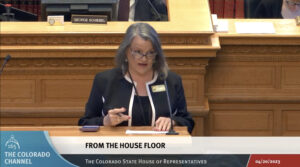An expected high-profile legislative debate over expansion of workers’ compensation benefits has ended even before it started, as business groups and workers’ comp attorneys agreed to a compromise that will grow payouts to a limited number of recipients.
The House Business Affairs & Labor Committee on Thursday gave unanimous backing to a significantly rewritten House Bill 1220 at its first hearing, setting the proposal on a likely fast track to being signed into law. The bill makes changes to current payout cap formulas so that the roughly 1% of workers’ compensation beneficiaries whose disability benefits hit the cap in such a way that they won’t get payment for permanent injuries likely won’t run into that problem.
Workers’ comp benefits — those paid to employees who sustain either temporary or permanent injuries on the job — have been a hot potato in recent years, with several contemplated or introduced bills proposing potentially expensive benefit expansions. Sponsors of a 2021 bill to expand doctors’ choice killed their effort, while other sponsors declined to introduce a widely circulated draft bill last year that would have ended the 108-year-old schedule of injuries that determines amounts paid out for various incapacitations.
Colorado has a two-tiered system for compensating injured workers, now capping payments for individuals suffering 19% impairment or less at $119,000 and for those with 20% or greater impairment at $238,000. Because some workers rack up significant disability benefits while receiving treatment, about 1% of Coloradans going through the system hit their payment cap and don’t get further compensation for the permanent nature of their injuries, a National Council on Compensation Insurance study found.
Compromise between business groups, attorneys
The original version of HB 1220, sponsored by Democratic Rep. Lindsey Daugherty of Arvada, sought to remove the lower cap and to replace the two-tiered system with one cap of $300,000. But because the vast majority of injuries are of 19% impairment or less, that essentially would have lifted the most common cap by 150% — and led to significant premium increases, industry leaders said.

Colorado state Rep. Lindsey Daugherty speaks to attendees at a Colorado Chamber of Commerce event in 2022.
Daugherty told the Workers Compensation Education Association of workers’ attorneys, Colorado Self Insurers Association, Colorado Chamber of Commerce, Colorado Competitive Council and leading insurer Pinnacol Assurance to find compromise. And what they came up with will benefit what Daugherty called the “most injured” workers without busting any budgets.
The revamped version of HB 1220 raises the lower cap to $185,000 — a 55% boost — and the upper cap to $300,000, which represents a 26% hike. It also allows injured workers to refuse offers of modified employment if such offers require them to drive against the advice of a physician, makes the loss of an ear or hearing equal in value to the loss of an eye or sight and requires payment of workers’ comp benefits through direct deposit if requested.
Daugherty touted the compromise and said that it will ensure that more injured workers get the full benefits that are defined in law.
A workers’ compensation win or just a lull in battle?
Pinnacol Assurance President/CEO John O’Donnell, meanwhile, told The Sum & Substance that the amended bill does not seek an unsustainable overhaul of the system.
“Colorado has one of the strongest and most reliable workers’ compensation systems in the country due in large part to a thoughtful framework that is designed to provide caring support for injured workers and cost certainty for employers,” O’Donnell said. “Given the outcome of today’s hearing, we’re grateful to the bill sponsor, as well as the chamber and industry partners for their leadership in advocating for an equitable approach that maintains certainty and reinforces the critical components that make up a successful workers’ compensation system.”
Workers’ advocates hinted, however, that this may not be their final ask regarding a boost in benefits for employees.
Stephan Marsh, a shareholder with Burg Simpson and president of the WCEA, said that while HB 1220 makes “meaningful changes,” it continues to leave in place “the flawed two-cap system.” Workers involved with cases that take longer amounts of time to settle still are more likely to reach their payment caps and be left without additional compensation for permanent injury, he said.
Two committee legislators also said they would back the bill but would like more to be done. Rep. Javier Mabrey, D-Denver, encouraged advocates to keep chipping away at the existing system and said legislators will “do more next year,” and Rep. Sheila Lieder, D-Jefferson County, called on advocates to take bolder steps than even the original version of the bill proposed.

Colorado state Rep. Sheila Lieder speaks on the House floor.
“I don’t think it goes far enough, but every little bit helps every year,” Lieder said. “I would like to see the caps removed.”
Ongoing debates over caps
The debate over workers’ compensation caps comes as debate rages as well over caps on damages that can be won in lawsuits.
Senate Bill 130, sponsored by Democratic Rep. Kyle Mullica of Federal Heights and Republican Rep. Perry Will of New Castle, would raise the $300,000 caps on noneconomic damages in medical malpractice actions to $500,000 over the course of five years. The proposal, which would raise caps that have remain unchanged since 2003, has not received a date yet for its first hearing before the Senate Judiciary Committee.
Meanwhile, two ballot initiatives coordinated by the Colorado Trial Lawyers Association would seek to eliminate noneconomic damage caps in catastrophic-injury and wrongful-death cases and to expand records that can be accessed in medical-malpractice suits, including communications between health-care providers about patients. Those are set to be heard Wednesday by the Colorado Title Board, which determines titles for measures before proponents can begin collecting signatures to get them onto the ballot.
Also, a business-led coalition known as Coloradans Protecting Patient Access filed two initiatives to cap attorney’s fees for personal-injury and wrongful-death suits at 25% of the money awarded to clients and to require attorneys to cap litigation expenses for clients at 10% more than the costs estimated for them at the beginning of the cases. The title board approved titles for those measures on Feb. 21.
